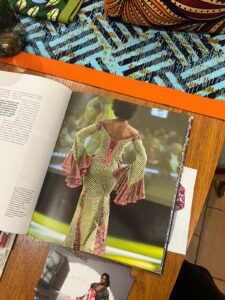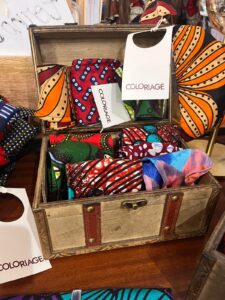A Possible Resolution to the Problems Faced by the Fashion Industry?
by Keon Eady
As our trip came to a conclusion, we visited a clothing and tailoring shop that provides support for migrant workers while utilizing upcycled materials for their fabrics. Through the clothing they produce, they display an integration of multicultural fashion designs with Italian craftsmanship and fashion. The name of this organization is Coloriage, located in the Trastevere neighborhood in Rome. The organization prides itself not only in their clothing but also in the craftsmanship of their workers who hand make everything. These workers hail from different countries (mostly in West Africa and South Asia), most of whom already had already worked as tailors in their home countries. Now in Italy, they have the opportunity to augment their tailoring skills while also receiving proper training and working contracts so they can be able to continue working in Italy; this is extremely important considering the prejudices and legal problems they face in Italy. Coloriage is also important because it displays ethically made and sustainably sourced fashion.
In our visit, director Valeria Kone gave us a great introduction of the company and was able to answer the questions we had for her. Our questions were centered around the sourcing of their materials, the selection process for their workers and also the brand itself (the designing process, the brands future, and the inclusivity of the clothing). Something that resonated with me was her response to my question regarding what “Made in Italy” meant for Coloriage. She replied saying that she felt like if anything it would help the company because contrary to many, she feels as though “Made in Italy” is less focused on nationalism and more focused on the passing down of Italian skills and traditions. One of these skills is Italian craftsmanship and she highlighted how the Coloriage helps teach this craft to immigrant members of the Italian community all while offering them a job opportunity. She added that “Made in Italy” is now dependent upon the skills of immigrants who want to do this work.
We also got the opportunity to talk with the workers (Fara and Ernest) and ask them about their working conditions and experience while also hearing about their journey to Italy. This was extremely similar to what we asked the workers from the Chinese community in Prato; however, at Coloriage the migrant workers seemed to have expressed a lot more joy and appreciation for the work they were doing. It was something they had a passion for before coming to Italy and the company allowed them to continue and shape their skills in Italy. We also felt a lot more confidence that when they said they worked for 8 hours a day (from 10-6) they were actually working those reasonable hours.
Coloriage gave us another example, like La Cartiera which we had visited earlier, of an organization committed to affordable sustainable fashion while also emphasizing ethical working practices. On this Mosaic we have studied the importance of sustainability and ethical working conditions as it relates to fashion. There has been an awareness of this because as we’ve learned the fashion industry is a significant contributor to pollution and climate change. In addition, due to capitalist ideals, it has lead to the proliferation of unethical workshops and factories. Experiencing companies such as the Coloriage provides us an example of a way to still contribute to fashion while being considerate of the people and world around you.


